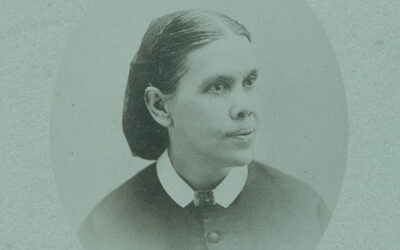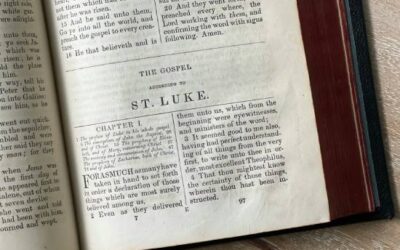Worry and fear are the ingredients of anxiety. It’s easy to see how the world isn’t perfect—and the anticipation of a bad event or experience (that may or may not even happen) can end up draining the peace and enjoyment from anyone’s life.
As it turns out, there are several examples in the Bible about people who were deeply worried or afraid. And the good news is that each of those examples have a corresponding passage that teaches us what we can do when we feel uneasy, anxious, or downright scared.
So let’s dive into the Word of God and discover:
- The causes of worry and fear
- What the Bible says about worrying
- How you can apply the Bible’s advice and overcome worry
We’ll begin by looking at the reasons behind our fears.
What causes us to worry or to be afraid?
It all starts with stress. When we’re overwhelmed, everything feels worse.
Add some fear of the unknown into the mix, and it’s a perfect storm of worry, dread, and cycles of anxious thoughts.
Essentially, we feel helpless. The lack of control hits us hard. Especially when accompanied by pressure, internally or externally, that you still must manage everything perfectly.
Stress is defined as any demand placed on your brain or body. So it’s inevitable that we’ll experience stress all throughout our everyday lives.
However, we feel “stressed out” when too many competing demands are placed on us all at once, making us feel frustrated, nervous, helpless, overwhelmed, depressed, anxious…the list can go on. And if the stress is severe, it can lead to aggressive behavior.
While a higher amount of stress isn’t always bad in the short term—like compelling us to study for an exam or overcome a big challenge—it’s still meant to be temporary.
If the worry and dread becomes so constant that it interferes with your daily life and interactions with others, then of course it becomes a serious problem.
In some cases, it could result in a diagnosis of a mental health issue under the broad category of anxiety disorders.
Other causes of worry include:
- Traumatic events – People who experience or witness abuse or trauma as children or as adults tend to develop anxiety disorders at some point in life.
- Major life changes – Events like moving to a new home, starting a new school or job, getting married, or even having a baby can cause worry if things aren’t going well or don’t meet prior expectations.
- Illness – Suffering from health condition or serious illness can cause significant worry about treatment options, expenses, preparing for the future, etc.
- Overwhelm – A big event, or a gradual buildup of smaller difficult life situations, can trigger anxiety. It could be a death in the family, work stress, family tension, or ongoing financial difficulties.
- Personality type – People with certain personality types tend to worry more than others—especially those who tend to think deeply about every detail of their lives.
- Mental health conditions – Any struggle with mental health can also cause anxiety. When it feels like the rest of the world operates differently than you do, the uneasiness or frustration can build up into anxiety.
- Genetics – Anxiety disorders can run in families. So having blood relatives with an anxiety disorder can predispose you to frequent worrying.
- Drugs or alcohol – Use, misuse, or withdrawal of drugs and alcohol can cause or worsen anxiety.
- Some prescription medications – Some medicines, like asthma inhalers, diet pills, and thyroid medications can worsen anxiety, especially if the ideal dosage is still being figured out.
Worrying over a long period of time can lead to other health problems:
- Medical conditions such as heart disease or high blood pressure
- Depression
- Lack of sleep
- Social isolation
- Inability to be productive at work or at school
- Suicidal thoughts
In these cases, the best advice is professional advice. This can be in the form of counseling, medication, or in some cases, lifestyle coaching.
If you or someone you know is distressed and possibly considering suicide, seek help right away. Several agencies provide free and confidential emotional support, 24 hours a day, such as the National Suicide Prevention Lifeline in the US: 1-800-273-8255.
It’s important to know that you don’t have to face these things on your own. There are always people willing to help, and God is always with you, listening to your prayers.
What does the Bible say about worry and fear?

Photo by Aaron Burden on Unsplash
There are verses all over the Bible that describe people feeling worry or fear. Characters like David, Martha, and Job are just a few examples of worry in the Bible:
- “Fear and trembling come upon me, and horror overwhelms me” (Psalm 55:5, ESV).
- “Martha, Martha, you are anxious and troubled about many things” (Luke 11:41, ESV).
- “For the things that I fear comes upon me, and what I dread befalls me. I am not at ease, nor am I quiet; I have no rest, but trouble comes” (Job 3:25-26, ESV).
But the great news is that, for all the worrying that humans express in the Bible, there are even more expressions of comfort, the peace of Christ, and God’s love.
The Bible leads us away from worry, telling us we have no need to fear (we’ll talk about how to not worry in a moment).
For example, the poet and king David writes in Psalm 23:
“Even though I walk through the valley of the shadow of death, I will fear no evil, for You are with me” (Psalm 23:4, ESV).
The prophet Isaiah expresses a similar sentiment:
“Fear not, for I am with you; be not dismayed, for I am your God; I will strengthen you, I will help you, I will uphold you with My righteous right hand” (Isaiah 41:10, ESV).
And as a last example, the apostle Paul, in his letter to the Romans, encourages believers against all trouble, including fear and worry. He assures them that “neither death nor life, nor angels nor rulers, nor things present nor things to come, nor powers, nor height nor depth, nor anything else in all creation, will be able to separate us from the love of God in Christ Jesus our Lord (Romans 8:38-39, ESV).
But one part of the Bible that talks extensively about worry comes from Jesus, so let’s see what our Savior Himself has to say about dealing with the difficulties and uncertainties of life.
What does Jesus say about worry and fear?
In Matthew 6, Jesus is preaching what is known as the Sermon on the Mount. A large part of this message is about not worrying and not being anxious, and instead placing your trust on God to provide for your needs.
Jesus says:
“Do not worry about your life, what you will eat or what you will drink, nor about your body, what you will put on. Is not life more than food and the body more than clothing?
Consider the birds of the sky: They don’t sow or reap or gather into barns, yet your heavenly Father feeds them. Aren’t you worth more than they?” (Matthew 6:25-26, CSB).
And
“Which of you by being anxious can add a single hour to his span of life?” (Matthew 6:27, ESV).
And
So don’t worry, saying ‘What will we eat?’ or ‘What will we drink?’ or ‘What will we wear?’ For the Gentiles eagerly seek all these things, and your heavenly Father knows that you need them. But seek first the kingdom of God and His righteousness, and all these things will be provided for you” (Matthew 6:31-33, CSB).
And
“Therefore, do not worry about tomorrow, for tomorrow will worry about itself. Each day has enough trouble of its own” (Matthew 6:34, CSB).
This whole section, Matthew 6: 25-34, is the dedicated go-to for those struggling with fearfulness amid the challenges of life. Entire Bible studies focus just on this chapter—there’s so much to think about and meditate upon.
But now that we know God doesn’t want us to worry or be afraid, let’s look more closely at passages that help us actually overcome the worries in our lives.
How to overcome worry, according to the Bible

Photo by Sincerely Media on Unsplash
Similar to the advice Jesus gives in Matthew 6, the Bible’s guidance for dealing with anxiety and frustration has to do with turning to God and claiming His promises.
Here are 4 ways you can do just that:
1. Trusting God
Solomon, the man gifted with much wisdom, guides us to trust God instead of in ourselves:
“Trust the Lord with all your heart, and do not lean on your own understanding” (Proverbs 3:5, ESV).
When we let go of all the things we hold onto and lean on God, the Bible says “He shall direct your paths” (Proverbs 3:6, NKJV).
And we can know that He will guide our paths even if we take a wrong turn, “For He Himself has said, ‘I will never leave you nor forsake you’” (Hebrews 13:5, NKJV).
“…Do not be afraid or discouraged, for the Lord your God is with you wherever you go” (Joshua 1:9, CSB).
Paul expresses the freedom that comes from trusting in the Lord. He says, “the Lord is my helper; I will not fear; what can man do to me?” (Hebrews 13:6, NKJV).
Truly, if our trust is in God, we need not fear what the world throws at us, for Jesus has “overcome the world” (John 16:33, ESV).
2. Reading God’s Word
God filled His Word with consolations for us in times of distress. The author of the Psalms especially leaned on God’s instruction when he was suffering.
David writes, “When the cares of my heart are many, your consolations cheer my soul” (Psalm 94:19, ESV).
He also says, “Your word is a lamp to my feet and a light to my path” (Psalm 119:105, ESV).
We can also turn to God’s instruction and promises to remember God’s goodness.
To help make this part of your routine, you can start an online Bible study or even just go through the Bible one chapter at a time.
And here are just a few great Bible stories that involve people learning to trust God:
- Shadrach, Meshach, and Abednego trust God through the fire (Daniel 3)
- Daniel trusts God to save him from a death sentence (Daniel 6)
- Deborah trusts God to guide amid a difficult time for Israel (Judges 4-5)
- David trusts God and slays a giant (1 Samuel 17)
- A sick woman trusts God, makes her way to Jesus, and is healed (Mark 5)
3. Praying
Not only does prayer give us a direct line of communication with God, but it also helps to calm our spirits by turning all of our thoughts toward God.
The Bible directs us to pray to God not matter what is troubling our minds:
“Do not be anxious about anything, but in everything by prayer and supplication with thanksgiving let your requests be made known to God. And the peace of God, which surpasses all understanding, will guard your hearts and your minds in Christ Jesus” (Philippians 4:6-7, ESV).
When we pray to God, the Bible says we will receive peace, which is exactly what we need in times of fear and worry. There is no peace like the peace God can give.
4. Giving your burdens to God and seeking His kingdom
Whenever we do pray to God, we can specifically ask for Him to take our burdens from us.
So many different things in life can feel like weight on our shoulders. But we don’t have to carry these burdens alone!
1 Peter 5:7 encourages us to be “casting all our cares on Him because He cares for us” (ESV).
And as we unload the weight of our worries onto Him, remember what Jesus said in Matthew 6 that we looked at earlier:
“Seek first the kingdom of God and His righteousness, and all these things shall be added to you” (Matthew 6:33-34, NKJV).
When we put God first, the Holy Spirit can fill our lives with peace. He’ll take care of everything else. Living the way that Jesus would live means giving our burdens to God and taking on the yoke of Jesus, which is full of peace:
“Come to Me, all who labor and are heavy laden, and I will give you rest. Take My yoke upon you, and learn from Me, for I am gentle and lowly in heart, and you will find rest for your souls. For My yoke is easy, and My burden is light” (Matthew 11:28-30, ESV).
A “yoke” is an ancient tool placed on cattle to help plow fields. These were heavy, and the animals wore them most of the day. But Jesus tells us that His “yoke” is easy and light.
When we cast our cares on Jesus and seek His righteousness, we will find rest. And not just rest for our bodies, but rest for our souls.
Jesus is the key to finding lasting peace
As you look to the Bible for wisdom and cast your burdens on God through prayer, you can begin looking into the future with hope. Hope of restoration, and that you have a chance at enjoying your life and finding the little blessings you might not have been able to see before.
But apart from this firm reliance on God, we have a part to play too.
There are simple things we can add to our daily routines that keep us on track when it comes to overcoming worry. And there are mindsets, or attitudes, we can cultivate that serve as a safeguard against worry and fear.
And with God helping you, constant worry can be a thing of the past.
Here are some Bible promises that assure us that God cares for you and there is no need to worry or fear.
Choose an Online Bible Study
Want to keep learning? Find out more about Jesus, humanity, the plan of salvation, and how God loves you enough to sacrifice everything, just to give you a chance to choose Him.
Sometimes it can be hard to know where to start, that’s why we offer free, user-friendly, online Bible study options you can do anytime, anywhere, and at your own pace.
This online Bible school will take you through the major themes of Scripture, breaking down the Bible’s complex concepts into bite-sized pieces, which can lead you toward the answers of life’s more challenging questions.
More Answers
El legado de Elena G. de White
El legado de Elena G. de WhiteyElena G. de White es un nombre muy conocido entre los Adventistas del Séptimo Día, pero también tuvo un impacto en muchas otras partes de la historia, además de ser cofundadora de la Iglesia Adventista. Por eso, la revista Smithsonian la...
All of Jesus’ Warnings and Encouragements in the Bible
Here’s a comprehensive list of every warning and encouragement from the words of Jesus, as well as how they can benefit our lives today.
¿Los Adventistas del Séptimo Día tienen “reglas”?
Sostenemos principios que creemos que nos ayudarán a mantener una relación más cercana con Jesús y su Palabra. Aprende cómo estos principios guían los estilos de vida adventistas.
Os Adventistas do Sétimo Dia têm “regras”?
Defendemos princípios que acreditamos nos ajudar a manter um relacionamento mais próximo com Jesus e com Sua Palavra. Saiba como esses princípios orientam o estilo de vida adventista.
Películas Adventistas: donde la fe y el cine se encuentran
La misión de la Iglesia Adventista del Séptimo Día desde el principio ha sido compartir la verdad de Dios en la Biblia.
Filmes Adventistas: Onde a Fé e o Cinema se Encontram
A missão da Igreja Adventista do Sétimo Dia desde o início tem sido compartilhar a verdade de Deus na Bíblia.
¿Por qué algunas Biblias tienen más libros que otras?
Los cristianos consideran la Biblia como sus escrituras sagradas. Pero dentro del cristianismo, diferentes denominaciones utilizan Biblias con cantidades diferentes de libros.
Por que algumas Bíblias têm mais livros do que outras?
Os cristãos consideram a Bíblia como suas escrituras sagradas. Mas dentro do Cristianismo, diferentes denominações usam Bíblias com números diferentes de livros.
O que você precisa saber sobre a tentação e como resistir a ela
Já se sentiu como se enfrentasse a mesma tentação dia após dia? Aquela tentação que sempre parece ressurgir?
O que os Adventistas do Sétimo Dia acreditam sobre a Bíblia?
A Bíblia forma a base de tudo o que os Adventistas do Sétimo Dia acreditam e ensinam.
Waadventista Wa Sabato wanaamini nini kuhusu Ubatizo?
Kama Wakristo wengi wa Kiprotestanti ulimwenguni kote na katika historia, Kanisa la Waadventista wa Sabato linaamini katika ubatizo, sherehe ambapo watu huzamishwa ndani ya maji kudhihirisha hadharani “kufa kwa maisha ya zamani” na “kuanza kwa maisha mapya katika Kristo”.
Jinsi Waadventista Wanavyoshughulikia Kifo na Mazishi
Mazishi mengi ya Waadventista wa Sabato yanafanana na yale ya madhehebu mengine ya Kiprotestanti, kama vile Wamethodisti, Wabatisti, au Wapresbiteri, lakini unaweza kupata tofauti chache au taratibu za pekee.
O que os Adventistas do Sétimo Dia acreditam sobre o batismo?
Assim como muitos cristãos protestantes em todo o mundo e ao longo da história, a Igreja Adventista do Sétimo Dia crê no batismo por imersão
¿Qué creen los Adventistas del Séptimo Día sobre el bautismo?
Al igual que muchos cristianos protestantes en todo el mundo y a lo largo de la historia, la Iglesia Adventista del Séptimo Día cree en el bautismo por inmersión
Does Jesus Really Care About Me?
Does Jesus Really Care About Me?Short answer: yes, Jesus really does care about you, specifically (1 Peter 5:7, ESV). But if you’re wondering whether Jesus Christ really, truly cares about you, you aren’t alone. Gideon, Abraham and Sarah, Job, Jeremiah, Elijah, even...
Filamu za Kiadventista: Mahali Imani na Filamu Zinapokutana
Tangu mwanzo, lengo la Kanisa la Waadventista wa Sabato limekuwa kueneza kweli ya Mungu katika Biblia.
Kwanini Baadhi ya Biblia Zina Vitabu Vingi Kuliko Nyingine?
Wakristo wanachukulia Biblia kama maandiko yao matakatifu. Lakini ndani ya Ukristo, madhehebu tofauti hutumia Biblia zenye idadi tofauti ya vitabu.
Fe y obras: ¿Importan ambas en la vida de un cristiano?
En tantas religiones a lo largo del tiempo, los individuos trabajan hacia la iluminación, la salvación o el favor de una deidad.
Cómo los Adventistas manejan la muerte y los funerales
La mayoría de los servicios funerarios Adventistas del Séptimo Día son similares a los de otras denominaciones protestantes, como los metodistas, bautistas y presbiterianos, pero podrías encontrar algunas diferencias o matices únicos.
What Did Ellen G. White Teach About Country Living?
Explore Ellen White’s counsels on country living and see how these principles might apply today.
What Are the Synoptic Gospels? What About John?
What Are the Synoptic Gospels? What About John?The term “Synoptic Gospels” refers to the accounts of the Gospel story—the story of Jesus Christ’s earthly ministry and how it paved the way for salvation—written by Matthew, Mark, and Luke in the New Testament. The word...
What Is “Soul Sleep,” and Is It Biblical?
“Soul sleep” is not the most common of theological phrases, but it does appear in enough places to bring about questions.
The Book of Luke’s Message: Jesus’ Love for All
Learn all about the book of Luke—context, themes, differences, and takeaways.
Como os adventistas lidam com a morte e os funerais
A maioria dos serviços funerários adventistas do sétimo dia são semelhantes aos de outras denominações protestantes, como Metodistas, Batistas ou Presbiterianos, mas você pode encontrar algumas diferenças ou nuances únicas.
Fé e Obras – Ambos Importam na Vida de um Cristão?
Em tantas religiões ao longo do tempo, indivíduos trabalham em direção à iluminação, salvação ou ao favor de uma divindade.
Imani na Matendo – Je! Yote Ni Muhimu katika Maisha ya Mkristo?
Katika dini nyingi katika nyakati zote, watu hufanya kazi kuelekea ufahamu, wokovu, au kibali kutoka kwa mungu.
¿Quién es el “Hijo del Hombre” en la Biblia?
Al llamarse a sí mismo el Hijo del Hombre, Jesús confirmó su papel como salvador de la humanidad. Aprende qué más nos dice este título sobre Jesús.
Kile Unachohitaji Kujua Kuhusu Majaribu na Jinsi ya Kuyapinga
Unajiuliza jinsi ya kupinga majaribu na kutoka kwenye mzunguko wa kushindwa? Yesu hutupa tumaini na kielelezo cha kukabiliana na majaribu ya shetani. Soma zaidi hapa!
Hatua Kuelekea kwa Kristo: Mwongozo wa Uhusiano na Yesu
Iwe unanza safari yako na Yesu Kristo, unarejea baada ya muda fulani, au umekuwa na uhusiano na Yesu kwa miaka, kutumia kitabu
Didn’t find your answer? Ask us!
We understand your concern of having questions but not knowing who to ask—we’ve felt it ourselves. When you’re ready to learn more about Adventists, send us a question! We know a thing or two about Adventists.



















